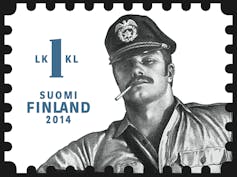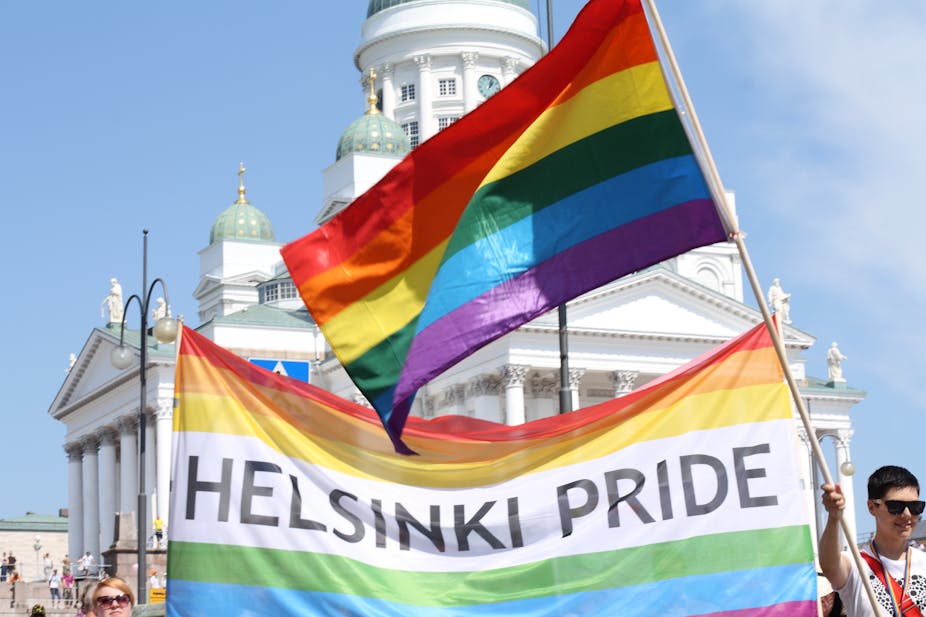Finland and Russia are next door neighbours and have a long shared history. But when it comes to lesbian, gay, bisexual and transgender rights, the two countries are worlds apart.
Finland has often sought to placate Russia over the years by allowing it to influence internal politics, but it is now taking a bold step. Following a parliamentary vote in November 2014, it looks like same-sex marriage will soon be legal in Finland – whether its neighbour likes it or not.
The November vote overruled a decision made by the parliament’s legal affairs committee, which had rejected a citizen-backed drive to amend marriage legislation and make it more inclusive. An amended marriage act is now predicted to come into force in 2016. This would bring Finland up to date with its Nordic peers to the west.
Further east, Russia continues to take the opposite path. In June 2013, the Russian parliament voted unanimously (with one abstention) to approve a law that effectively criminalises any public presentation of homosexuality as normal or equal to heterosexuality that could conceivably be seen by minors.
The decision sparked international condemnation in the lead up to the 2014 Winter Olympics in Sochi. Paavo Arhinmäki, Finland’s minister for sport at the time, refused to attend the opening ceremony, citing concern over Russia’s human rights record. A few months earlier, he had made his feelings about Russia’s stance clear by waving a rainbow flag at the World Athletic Championships in Moscow.
The gap between these two countries on LGBT rights has implications not only for how Finland sees Russia, but also how it views itself. A veiled wariness of Russia persists in Finnish politics and society, and this now extends into concerns for Finland’s LGBT community.
Testing the boundaries
Lappeenranta, in south-eastern Finland, is one of Finland’s primary border towns with Russia. A significant part of the local economy is geared towards visitors from Russia, who cross the border looking for good deals on luxury items.

In September 2014, a local newspaper, Lappeenrannan Uutiset, interviewed a handful of Russian visitors on what they thought of a new series of Finnish postal stamps honouring the iconic gay artist Touko Laaksonen, better known as Tom of Finland. The stamps featured his famous drawings of muscular men in various states of undress. The reaction, it appeared, was uniformly negative.
Lappeenrannan Uutiset followed their report up with an experiment. Two male journalists were sent walking around the streets of Lappeenranta hand-in-hand, in full view of Russian tourists. They reported some rubbernecking, stares and snickers, but no outright intimidation or hostility. The local police assured gay couples they should have nothing to fear.
Yet, the Lappeenranta articles showed how divided Finns and Russians are on this issue – many Russians see LGBT rights as a symbol of western moral decay, while Finns see the changes taking place as a symbol of modern Nordic social progress.
Playing nice
The trouble is, Finland has a history of pragmatism in its relations with Russia. It is a small country with a much larger, powerful neighbour which has an extensive history of expanding its “sphere of influence”. Finland was a part of the Russian Empire for more than a century, from 1809 to 1917, and fought two wars with the Soviet Union between 1939 and 1944 to narrowly maintain its young independence.
During the Cold War, Finland’s long-serving president, Urho Kekkonen, decided that for his country to maintain a degree of freedom from Russia, it would have to make some voluntary concessions.
So Finland has not joined NATO, and resisted efforts to forge closer defence ties with other Nordic states – which would have been unpalatable for the Soviet Union. Western observers described this phenomenon as “Finlandisation”. In order to maintain its titular independence, Finland willingly allowed its larger neighbour to meddle in its internal affairs.
Parts of the Finnish media have also preferred to tread carefully when it comes to discussing Russia and LGBT rights. In a recent article about Finnish couples planning to adopt children from Russia, the Finnish national broadcaster YLE (which has historically been accused of promoting the government line on Finlandisation) notes that Russian law forbids adoptions to countries that permit same-sex marriage. It suggests that changing Finland’s marriage laws could prevent Finnish heterosexual couples from adopting Russian children. No judgement is passed on Russia’s anti-LGBT policies, but the implication is that Finland should still consider how Moscow might react to changes in its internal laws.
The need to avoid Russian expansionism is ever more pressing, given recent events in Ukraine. The predicament for modern Ukraine has been compared to Finland during the Cold War. Andrej Illarionov, Putin’s chief economic adviser from 2000 to 2005, caused some alarm in March 2014 when he told a Swedish newspaper that Putin hoped to “reclaim” Finland and restore the former borders of the Russian Empire.
Drawing a line in the sand
And yet, it would be unfair to characterise the tone in Finland as returning to Finlandisation. There are no real indicators that the country will walk back its intended gay-marriage legislation for the sake of Russian sensibilities. Nor is it likely to allow Russian authorities to use adoption regulations to shape or influence Finnish policy on LGBT rights.
In the Cold War, under Finlandisation, the Soviet Union was able to prevent the deepening of Finnish cooperation with the other Nordic states. Now, however, Finland’s gay-marriage law will bring it into line with Nordic norms, and affirm a degree of commitment to the social values that have come to characterise the Nordic region.
LGBT-rights may serve as a decisive issue for Finland in presenting itself as a modern Nordic state, leaving its historical reputation as almost a Russian vassal-state in the past.

